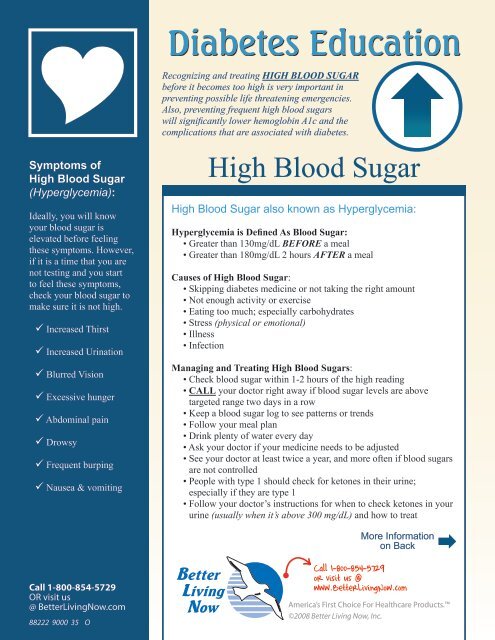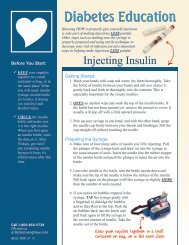High Blood Sugar - Better Living Now Health Education Guide
High Blood Sugar - Better Living Now Health Education Guide
High Blood Sugar - Better Living Now Health Education Guide
You also want an ePaper? Increase the reach of your titles
YUMPU automatically turns print PDFs into web optimized ePapers that Google loves.
Diabetes<br />
Symptoms of<br />
<strong>High</strong> <strong>Blood</strong> <strong>Sugar</strong><br />
(Hyperglycemia):<br />
Ideally, you will know<br />
your blood sugar is<br />
elevated before feeling<br />
these symptoms. However,<br />
if it is a time that you are<br />
not testing and you start<br />
to feel these symptoms,<br />
check your blood sugar to<br />
make sure it is not high.<br />
ü Increased Thirst<br />
ü Increased Urination<br />
ü Blurred Vision<br />
ü Excessive hunger<br />
ü Abdominal pain<br />
ü Drowsy<br />
ü Frequent burping<br />
ü Nausea & vomiting<br />
<strong>Education</strong><br />
Recognizing and treating HIGH BLOOD SUGAR<br />
before it becomes too high is very important in<br />
preventing possible life threatening emergencies.<br />
Also, preventing frequent high blood sugars<br />
will significantly lower hemoglobin A1c and the<br />
complications that are associated with diabetes.<br />
<strong>High</strong> <strong>Blood</strong> <strong>Sugar</strong><br />
<strong>High</strong> <strong>Blood</strong> <strong>Sugar</strong> also known as Hyperglycemia:<br />
Hyperglycemia is Defined As <strong>Blood</strong> <strong>Sugar</strong>:<br />
• Greater than 130mg/dL BEFORE a meal<br />
• Greater than 180mg/dL 2 hours AFTER a meal<br />
Causes of <strong>High</strong> <strong>Blood</strong> <strong>Sugar</strong>:<br />
• Skipping diabetes medicine or not taking the right amount<br />
• Not enough activity or exercise<br />
• Eating too much; especially carbohydrates<br />
• Stress (physical or emotional)<br />
• Illness<br />
• Infection<br />
Managing and Treating <strong>High</strong> <strong>Blood</strong> <strong>Sugar</strong>s:<br />
• Check blood sugar within 1-2 hours of the high reading<br />
• CALL your doctor right away if blood sugar levels are above<br />
targeted range two days in a row<br />
• Keep a blood sugar log to see patterns or trends<br />
• Follow your meal plan<br />
• Drink plenty of water every day<br />
• Ask your doctor if your medicine needs to be adjusted<br />
• See your doctor at least twice a year, and more often if blood sugars<br />
are not controlled<br />
• People with type 1 should check for ketones in their urine;<br />
especially if they are type 1<br />
• Follow your doctor’s instructions for when to check ketones in your<br />
urine (usually when it’s above 300 mg/dL) and how to treat<br />
More Information<br />
on Back<br />
Call 1-800-854-5729<br />
OR visit us<br />
@ <strong>Better</strong><strong>Living</strong><strong>Now</strong>.com<br />
88222 9000 35 O<br />
Call 1-800-854-5729<br />
or visit us @<br />
www.<strong>Better</strong><strong>Living</strong><strong>Now</strong>.com<br />
America’s First Choice For <strong>Health</strong>care Products.<br />
©2008 <strong>Better</strong> <strong>Living</strong> <strong>Now</strong>, Inc.
Diabetic<br />
Check For Ketones:<br />
1. To check for ketones<br />
your glucose meter<br />
may have the option<br />
to check for ketones in<br />
your blood.<br />
2. The urine is the MOST<br />
common way to check<br />
for ketones.<br />
<strong>High</strong> <strong>Blood</strong> <strong>Sugar</strong><br />
ketoacidosis (DKA):<br />
Diabetic ketoacidosis is more common in people with type 1 diabetes.<br />
But this can also happen, but less frequently, in people who have type<br />
2 diabetes. DKA happens when the brain runs out of glucose (sugar) to<br />
use and starts using fat for energy.<br />
The brain needs mainly glucose for energy to function normally. When<br />
insulin is not bringing glucose into the cells, glucose in the blood will<br />
rise. Also, glucose is not reaching the brain, and the brain starts using<br />
fat for energy. It can only do this for a short time before it starts making<br />
ketones, which is made when fat breaks down. If left untreated ketone<br />
levels in the blood increase that could lead to a DIABETES COMA<br />
also known as diabetes ketoacidosis. This is a life threatening condition<br />
that requires a 911 call.<br />
Warning Signs of Diabetic Ketoacidosis:<br />
ü <strong>High</strong> blood sugar (greater than 300 mg/dL)<br />
ü Fruity acidic breath<br />
ü Abdominal pain or cramping<br />
ü Rapid breathing<br />
ü Shortness of breath<br />
ü Moderate to large urine ketones<br />
Call your doctor immediately or go to the emergency room if you<br />
experience ONE or MORE of these symptoms.<br />
Check For Ketones:<br />
To check for ketones your glucose meter may have the option to check<br />
for ketones in your blood.<br />
If not, your doctor should have given you ketone strips. These are<br />
dipped in a sample of your urine when it is suspected that your blood<br />
sugar is high. After dipping the urine stick, check the color against the<br />
color on the bottle. If the color on your urine stick matches the one on<br />
the bottle for ketones, you are spilling moderate to large ketones in your<br />
urine and should CALL your doctor IMMEDIATELY!<br />
Call 1-800-854-5729<br />
OR visit us<br />
@ <strong>Better</strong><strong>Living</strong><strong>Now</strong>.com<br />
Call 1-800-854-5729<br />
or visit us @<br />
www.<strong>Better</strong><strong>Living</strong><strong>Now</strong>.com<br />
America’s First Choice For <strong>Health</strong>care Products.<br />
©2008 <strong>Better</strong> <strong>Living</strong> <strong>Now</strong>, Inc.




